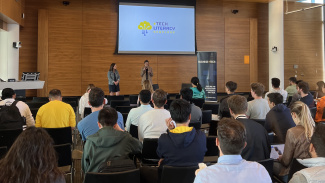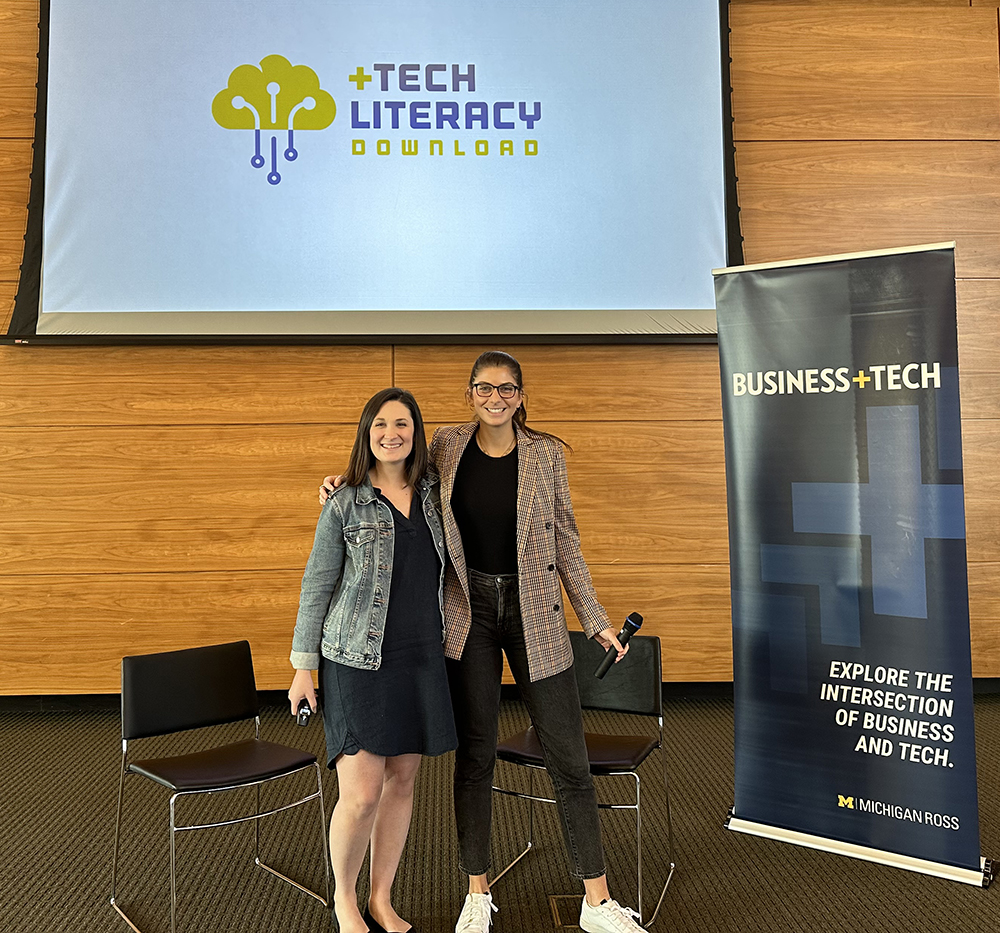Month-Long Tech Literacy Download Highlights the Importance of Technology in All Industries and the Emerging Trends in Fit Tech

As fitness, technology, and the role of data continue to evolve post-pandemic, fit tech was at the forefront of conversations during the second annual Business+Tech Literacy Download.
Organized by the B+T initiative at the Ross School of Business, the month-long series was open to students across the University of Michigan with the intent to increase technical literacy and competency through hands-on workshops and industry-led information sessions.
About tech at Michigan Ross and the +Tech Literacy Download
 Technology is one of the top recruited industries at Michigan Ross, and many students seek to gain experience in the industry as a result. That includes +Tech Literacy Download co-lead Maria Sinagra, MBA ‘23, who said she knew she wanted to be involved in educating people about technology coming into Ross.
Technology is one of the top recruited industries at Michigan Ross, and many students seek to gain experience in the industry as a result. That includes +Tech Literacy Download co-lead Maria Sinagra, MBA ‘23, who said she knew she wanted to be involved in educating people about technology coming into Ross.
"Working at Deloitte before Ross, I was fortunate enough to know what was going on in emerging tech,” said Sinagra. “Almost every company has technology involved in it, and exploring what is disrupting the industry helps to inform successful business leaders and educate our classmates and future founders so that they can integrate it into their business plans and understand how to work cross-functionally."
Sinagra and fellow co-lead Eliza Brooks, MBA ‘23, excitedly shared their passions of bringing technology literacy to their classmates. "What we are trying to communicate is that whether you are technical or coming from a business lens, we will all have to work together and need to ride the line of understanding where other teams are coming from," they said. They brought in new industries to curate 16 unique events that students across the board would be interested in, from FitTech to Agriculture and Healthcare, covering AI, Blockchain, Data, Crypto, Digital, and more. The team partnered with other Michigan Ross student organizations such as the Zell Lurie Commercialization Fund; Healthcare & Life Sciences Club; Food, Bev, and Ag Club; Tech Club; and FitX to co-sponsor some of the sessions and offer a mix of virtual and in-person conversations and workshops.
"As a student body at Ross, students feed off the ideas and energy of one another." Sinagra said. "The more people learn and care about these topics, the more it will expand into our student body.”
Growing increase in fit tech
There is value in becoming literate in technology, and +Tech Literacy Download strives to do just that, as well as see the value in working across industries and functions. An emerging trend that this year's programming focused on was fitness technology, or fit tech.
“As fit tech as an industry continues to grow, we have seen a huge increase in the number of students looking to recruit with companies in the space, such as Whoop and Oura,” said Michigan Ross FitX club president Kate McCarter, MBA ‘23.
McCarter and Sinagra both saw fitness tech and connected fitness particularly explode during the pandemic when people were more keen to track their health and stay connected during workouts in spite of gym closures. Sinagra found herself going from working out at boutique studios to doing nothing at home, and the use of technology in fitness fostered a virtual community as she and her friends followed each other on bikes and watches.
Among the speakers the B+T team welcomed were: Equinox's Chief Technology Officer Eswar Veluri to discuss digital innovation in the fitness industry. Working with Equinox in a variety of roles, from digital products to consumer technology, Veluri has seen Fit Tech evolve, especially as traditional in-person business was impacted during COVID. He described the ways in which Equinox innovated to create unique and special on-demand, streaming, and digital experiences while still representing the gold-standard service one would expect in their brick and mortar. Using data to personalize those experiences, Mr. Veluri said he enjoyed meeting the people who were experiencing his product. His advice to those students interested in working in product was to interact with the end user and understand their user journey, coupling these insights with data, as companies and individuals have more access to data than ever before.
Fit tech, while popularized during pandemic lockdowns, is here to stay. McCarter is interested to see as we begin to move out of the peak-COVID era, how these companies keep up with changing consumer demands. She’s equally excited to watch FitX, a newer industry club focused on fitness, health, wellness, innovation, and technology unique to Michigan Ross, continue to grow as the fit tech industry grows.
Wearables and data insights
"Fit tech is interesting because people can relate to it," Brooks said. "Seeing across all industries, insights, and analytics continues to be an emerging trend." She sees this data only continuing to improve and elevate health and fitness experiences as augmented reality and gamification become other popular aspects of the fit tech world.
As consumers continue to care more about health and wellness and the data behind their workouts, wearable tech has continued to grow from the original step trackers to span a large range of applications and solutions. Brooks purchased her Oura ring (a wearable device that tracks stats using sensory technology), to better understand her own stats and what they mean for her own health. She was excited to welcome back Ross alums Mari Mankey, MBA '22, and Tim Schmidt, BA '01, to talk about their experiences of incorporating data insights into wearables at Oura and Fitbit.
During the event, Schmidt said building community has become the biggest selling point of their products at Fitbit. He attributed increased virtual working options creating a need for increased engagement across companies and within functions. Schmidt highlighted the benefits a wellness program brings beyond just health, including building connectivity across virtual work environments using Fit Tech and wearables.
The biggest challenges and opportunities with data in the fit tech space revolve around trust and transparency; the main takeaway from all speakers was that while more data is good, more data is also dangerous.
“At Oura, data is what we do,” said Mankey. Her focus is to share with people things they normally wouldn't know about themselves. She discussed Oura using data that can help early prediction and prevention of diseases such as COVID-19 and insomnia, things that one typically wouldn't know unless they were meticulously tracking this information over time.
But when it comes to sharing data, there needs to be sensitivity on what data is tracked and user control over what data is shared. As a consumer herself, Brooks wants more information, but recognizes there is a fine line between offering helpful insights and those that cause consumers to question if they can trust you with that level of data. “This is what our future product leaders and analytics managers need to figure out — what the consumer wants without overstepping,” she said.







